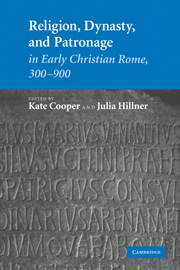Book contents
- Frontmatter
- Contents
- Acknowledgements
- List of contributors
- Abbreviations
- Introduction
- PART I ICONS OF AUTHORITY: POPE AND EMPEROR
- PART II LAY, CLERICAL, AND ASCETIC CONTEXTS FOR THE ROMAN GESTA MARTYRUM
- 3 Domestic conversions: households and bishops in the late antique ‘papal legends’
- 4 Agnes and Constantia: domesticity and cult patronage in the Passion of Agnes
- 5 ‘A church in the house of the saints’: property and power in the Passion of John and Paul
- PART III RELIGION, DYNASTY, AND PATRONAGE
- Bibliography
- Index
3 - Domestic conversions: households and bishops in the late antique ‘papal legends’
Published online by Cambridge University Press: 02 October 2009
- Frontmatter
- Contents
- Acknowledgements
- List of contributors
- Abbreviations
- Introduction
- PART I ICONS OF AUTHORITY: POPE AND EMPEROR
- PART II LAY, CLERICAL, AND ASCETIC CONTEXTS FOR THE ROMAN GESTA MARTYRUM
- 3 Domestic conversions: households and bishops in the late antique ‘papal legends’
- 4 Agnes and Constantia: domesticity and cult patronage in the Passion of Agnes
- 5 ‘A church in the house of the saints’: property and power in the Passion of John and Paul
- PART III RELIGION, DYNASTY, AND PATRONAGE
- Bibliography
- Index
Summary
And what is more suitable to the Christian faith than that there should be a forgiveness of sins not only in the church but also in the homes of all men?
Leo, Sermo 49.5. Lent, 457 adThe idea that Christianity orders a moral topography extending from ecclesia to domus figures prominently in the sermons of the Roman bishop Leo I (441–461). ‘Rule your slaves and those who are subjected to you with fairness; let none of them be tortured by imprisonment or chains’, he exhorted his congregation on the first Sunday of Lent in 444. Elsewhere Leo urgently directed his congregation to search their homes for heretics, while his successor Gelasius (492–496) expressly targeted aristocratic households in an open letter to a leading Roman senator, in which he railed against their participation in the Lupercalia, an archaic Roman fertility rite that was still performed annually by Rome's elite residents as late as the 490s. We might also consider anecdotes about financial assistance to impoverished matronae, stories of bishops helping to arrange marriages, and episcopal involvement in monastic foundations as evidence for the bishop's growing interest in, and sense of responsibility for, the city's various households.
Leo's demand for an ethical parity between household and church recalls a familiar paradigm in ancient political and biblical thought.
- Type
- Chapter
- Information
- Publisher: Cambridge University PressPrint publication year: 2007
- 1
- Cited by



